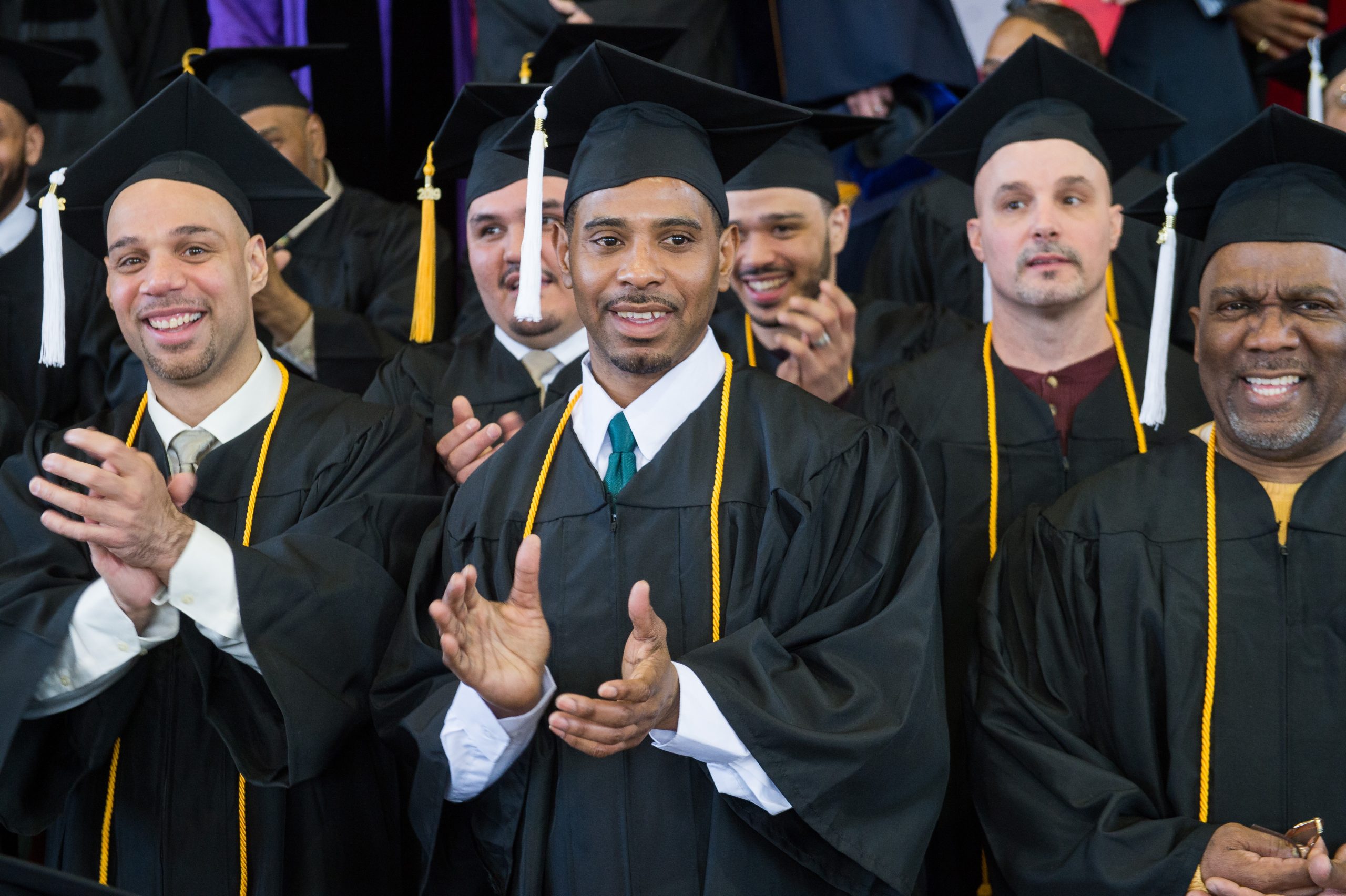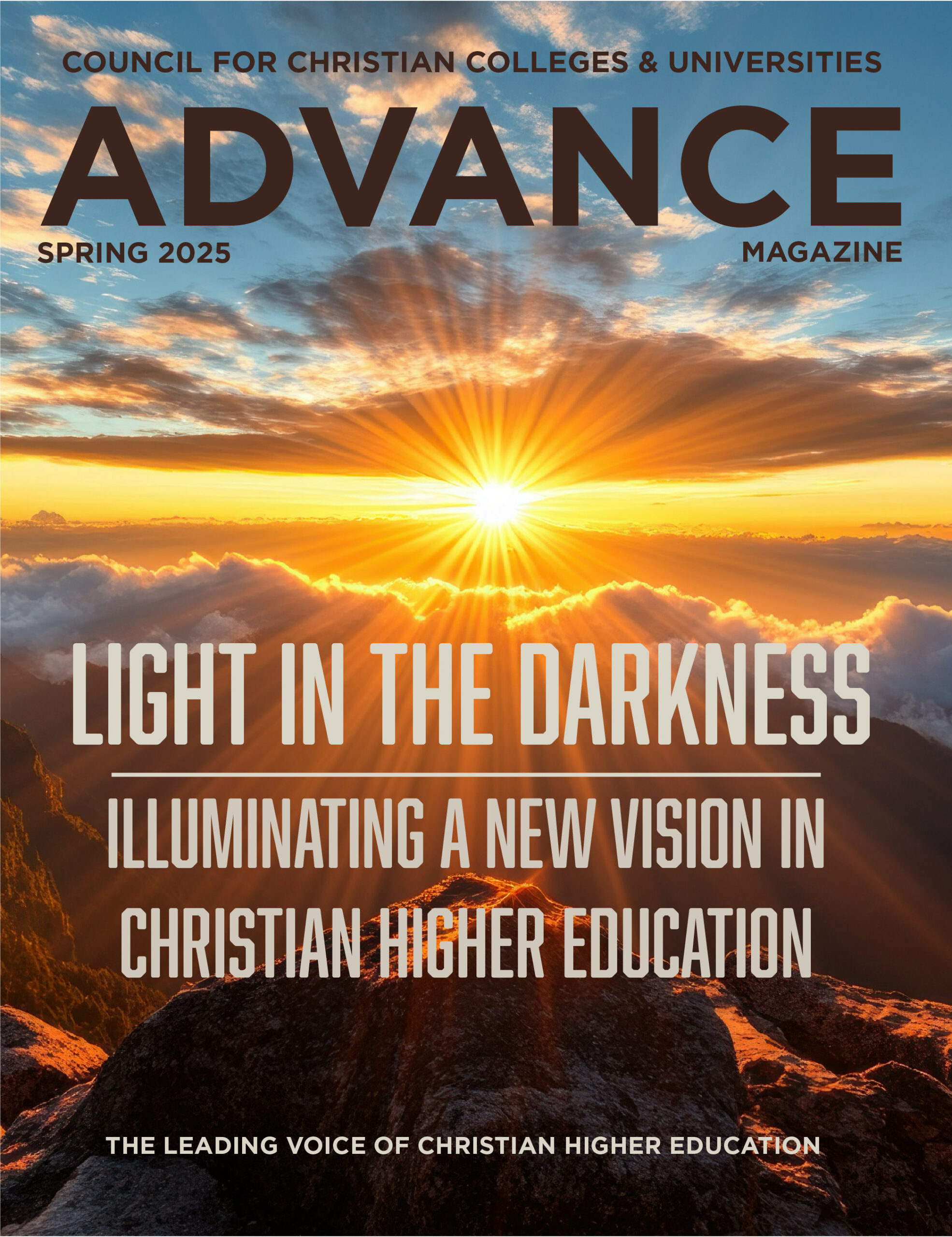News and Publications
WASHINGTON — The Council for Christian Colleges & Universities (CCCU) is once again partnering with Prison Fellowship to promote Second Chance Month, a national effort to reduce barriers keeping formerly incarcerated Americans from reaching their full potential as they reenter society.
Following the passage of the FIRST STEP Act in December 2018 — a significant accomplishment in criminal justice reform that promises a more just and rehabilitative federal prison system — another significant step occurred in December 2020, when Congress passed bipartisan legislation lifting the 26-year ban on Pell Grants for incarcerated students. This will make it possible for thousands to access higher education, and in turn will create opportunities for them to secure well-paying jobs, find stable housing, provide for their families, and reintegrate into their communities when they leave prison. The law is “sentence-blind,” meaning that all incarcerated people can apply for Pell Grants, regardless of conviction or sentence length. It is expected that 64% of people in state and federal prison—or half a million people—will now be eligible for federal student aid no later than July 1, 2023.
For the 2.3 million individuals currently incarcerated in the United States in federal or state prisons, education can be a driving force in changing the trajectory of their lives and propelling them towards successful reentry into society following release. According to a study by Georgetown Law School and the Vera Institute of Justice, only 9% of individuals leave prison with a postsecondary education, although over 70% of incarcerated men and women desire to participate in an education program.
The benefits of educational opportunities are profoundly positive. A study by the RAND Corporation found that incarcerated people who participate in education programs are 48% less likely to recidivate, and 13% more likely to gain employment upon release. Prison education also saves taxpayer dollars. In fact, every dollar invested in correctional education is estimated to save nearly $5 in reincarceration costs over three years.
“Championing higher education in our criminal justice system is an idea all of higher education can embrace,” shares CCCU President Shirley V. Hoogstra. “The positive effects for the prisoner, their families, and the wider community are clear and well-documented. In Matthew 25:36, Jesus says, ‘I needed clothes and you clothed me, I was sick and you looked after me, I was in prison and you came to visit me.’ An education recognizes the God-given dignity of all individuals. It provides a fresh start. And it provides the confidence to face a new future and look candidly at the past.”
“Every person, including the one in three American adults with a criminal record, has God-given dignity and potential. Now, more than ever during the novel coronavirus pandemic, it is crucial that we raise awareness about the challenges men and women face upon reentry as they seek healthcare, housing, and employment,” shares Heather Rice-Minus, Senior Vice President of Advocacy and Church Mobilization for Prison Fellowship. “This April 2021, despite the inability to gather physically, there is so much ground we can gain together in advocating for a culture of second chances.”
Numerous CCCU institutions offer educational and/or professional opportunities to incarcerated or formerly incarcerated individuals; their stories are featured below.
Verbatim
- “When I’m in a Nyack College class, I’m not in prison.” –Nyack College student
- “Before being accepted into Lipscomb, I thought that I wasn’t worth an education beyond high school. Upon entering the program, I’ve discovered that I am worthy and intelligent enough to pursue one of several degrees I am planning on obtaining. Thank you for giving someone like myself the opportunity to expand my mind beyond these incarcerated walls.”—Lipscomb University student
- “God is not done with me yet. He is putting me to work, giving me a purpose for his kingdom. My life of freedom may be over, but I am not down and out. Never count God out.”—Corban University student
- “I came in as a failure 18 years ago. I didn’t allow myself to dream. Eighteen years later, I stand in the same spot as I failed, and have succeeded.” —York College student
- “Today, closing in on one year after being released from prison, and thanks to PEP’s re-entry team, I am gainfully employed. I am thankful PEP chose me and grateful to those who make this life change possible for men like me.” —Prison Education Program (PEP) student
- “Education in prison allowed me to regain my humanity and gave me hope for my future. It helped change my trajectory.” —Eastern University student
Prison Education Programs at CCCU Institutions
Baylor has been involved with the Prison Entrepreneurship Program (PEP) for more than 10 years. The Baylor Institute for Studies of Religion has studied the program’s effectiveness, and Baylor MBA students have worked closely with PEP participants since 2007, reviewing their business plans and providing guidance, research, editing, marketing information and more. Basically, PEP participants become Baylor MBA students’ first consulting clients. They have pioneered innovative programs that unites business executives and MBA students with inmates through entrepreneurial passion and servant leadership to transform lives, restore families and rebuild communities.
Calvin Theological Seminary (CTS) began holding a few unaccredited seminary courses for inmates at Michigan’s Handlon Correctional Facility in 2005. Inspired by the results, CTS partnered with Calvin University and, in 2015, launched a fully accredited five-year program for prisoners who want to earn a bachelor’s degree in faith and community leadership. The Calvin Prison Initiative (CPI) now accepts a cohort of 20 students each year and offers degrees to inmates with life sentences, not only those who will be released. While many prison education programs only enroll soon-to-be-released prisoners, CPI believes education can transform prison culture from within by affirming the inherent dignity of all prisoners, even those who will not re-enter the larger society. CPI graduated their first cohort of students in spring 2020—a momentous occasion for the state of Michigan, as this was the first time bachelor’s degrees were earned inside prison walls.
In August of 2019, Campbell University began offering academic courses to a cohort of 15 offenders at Sampson Correctional Institution. This two-year accredited program allows the offenders in the program an opportunity to earn an Associate of Science in Behavioral Sciences degree. Since this program’s students will be released in a few years after the program’s completion, students who have successfully completed the ASBS program at Sampson Correction may choose to continue their education and earn a four-year degree at Campbell or another university or college. Fifteen students began the ASBS program at Sampson, and in the first two semesters, 12 of them earned Dean’s List recognition, and four students earned President’s List honors.
Columbia International University
Columbia International University’s Prison Initiative continues to train inmates to impact the South Carolina Department of Corrections (SCDC) with the gospel of Jesus Christ. After 14 years, the Prison Initiative has graduated 169 inmates who received an accredited Associate of Arts degree. These graduates serve in 21 institutions around the state under the supervision of SCDC Chaplains. They are utilized in various capacities from preaching and teaching, hospice care, worship leaders, crisis and suicide prevention, and chaplain clerks. Although COVID-19 hindered training and ministry opportunities for most of last year, our students are back in class this spring and are working to finish their degrees.
Modeled after other highly successful programs, Paid in Full Oregon does what has never before been done in Oregon: provide student inmates with a fully accredited four-year Bachelor of Science degree in Liberal Arts with emphasis in Psychology, Social Service, and Leadership through partnership with Corban University and the Oregon Department of Corrections (DOC). Transforming convicted felons into spiritual leaders and then sending those leaders throughout the prison system to transform the lives of others is the heart of the mission and purpose of Paid in Full Oregon.
The Prison Education Program (PEP) at Eastern University provides a variety of educational experiences for individuals who are incarcerated and returning from incarceration. The program serves incarcerated men at SCI Chester, a medium–security prison located 17 miles from the campus, by providing them with educational experiences (including practical, life skills classes) to assist them with reentry. Eastern University’s PEP was selected by the U.S. Department of Education for the Second Chance Pell experimental site program.
The relationship between Greenville University (GU) and the Greenville Federal Correctional Institution (FCI) dates back to the opening of FCI in 1994. GU faculty and staff volunteered in a number of roles ranging from directing plays and leading Bible studies to conducting mock interviews and tutoring inmates enrolled in the prison’s GED program. The Greenville University @ Greenville FCI program began offering credit classes to inmates in 2014. GU faculty have taught classes at FCI’s medium-security facility for men and its minimum-security satellite camp for women. The classes at the camp entail a blended format in which GU students study alongside women inmates. FCI students who participate in the program learn, feel a sense of accomplishment, and experience the love of God in fellowship with others.
In partnership with the Missouri Department of Corrections and the Global Prison Seminaries Foundation, Hannibal-LaGrange University will provide theological education for long-term prisoners by offering an undergraduate Christian studies degree program within the maximum-security Jefferson City Correctional Center. The program began July 1, 2020. The program’s vision is to equip and send offenders out to work as field ministers in prisons across the state by teaching them to think biblically, to think deeply, to act justly, and to live as Christ’s representatives in the prison system and the world.
Houghton College—Buffalo East offers Associate of Arts degree programs for local, justice-involved, and at-risk individuals. Many of these individuals believe that a college education isn’t within their reach—whether because of the arduous application process for people with criminal convictions, the cost of tuition, doubts about their readiness for college-level work, or concerns about whether they would fit in on a traditional college campus. Houghton Buffalo East, located in the King Urban Life Center, was established to address these concerns by providing a variety of academic supports and case management services not typically available on college campuses. Although Houghton College does not offer classes inside correctional facilities, its mission is similar to that of college-in-prison programs: to provide vulnerable members of our society with a crucial tool for re-entry, workplace readiness, and personal growth.
At Lipscomb University, traditional students (“outside students”) can enroll in classes held onsite at the Tennessee Prison for Women and study alongside residents of the prison (“inside students”). The Lipscomb Initiative for Education (LIFE) Program began in 2007, and students may earn an Associate of Arts degree, a Bachelor of Professional Studies degree, and/or a Master of Arts degree from Lipscomb University through the Lipscomb LIFE program. Currently 53 inside students are enrolled in Lipscomb through the LIFE program. In the summer of 2018, Lipscomb started the first seminary in a woman’s prison in the country. Its Hazelip School of Theology offers a Master of Arts in Christian Ministry with an emphasis in spiritual care to women who are residents of the prison along with additional students who do not reside inside. In December 2019, three women graduated with their bachelor’s degrees, totaling 10 students to earn their undergraduate degree through the program. Three more students also earned their associate degree, totaling 20 women to complete their AA since the inception of LIFE in 2007. As a result of a one-year grant from the state of TN, LIFE has the opportunity to expand enrollment and offer academic classes at the local men’s prison.
The Prison-to-College Pipeline Program (PTCPP), a university-community engagement initiative, promotes higher education in prison in response to high incarceration rates and the ongoing need for increased access to educational opportunities in the state of Mississippi. Above all, the PTCPP helps students who are imprisoned in the state of Mississippi who have attained a GED (or possess a high school diploma or high school equivalency diploma) to pursue and attain college credit through a variety of course offerings. The PTCPP currently offers on-site, humanities-based college-level courses for imprisoned men at Parchman/Mississippi State Penitentiary and for imprisoned women at Central Mississippi Correctional Facility (CMCF).
Recently, North Park Theological Seminary partnered with Stateville Correctional Center outside of Chicago to offer graduate courses onsite. The courses combine seminary students, undergraduates, and incarcerated students to examine the prison system from interpersonal, communal, social justice, and faith perspectives. North Park launched a full Master of Arts Degree in Christian Ministry at Stateville Correctional Center, enrolling 70 incarcerated students to the four-year degree program and four outside (”free”) students who take their courses at Stateville. The program just admitted 20 women for fall 2021 from Logan Correctional Center, a women’s facility. The vision is to prepare people for ministry in contexts, such as prison, that are susceptible to violence. They offer traditional seminary courses as well as other courses on conflict transformation, race relations, and trauma and healing. North Park offers several for-credit courses for non-degree seekers and allows North Park seminary and undergraduate students to take these courses for credit. They also offer a writing course to certify incarcerated students to become writing assistants under North Park’s Writing Center.
Nyack College was one of 67 colleges and universities selected to participate in the U.S. Department of Education’s Second Chance Pell pilot program in 2016. Nyack has offered bachelor’s degrees at New York Correctional Facilities since 1998. The new funding allowed them to expand their offerings. This year, they enrolled 89 students at Fishkill Correctional Facility. Nyack offers bachelor’s degrees in Interdisciplinary Studies: Psychology and Social Work and associate’s degrees in liberal arts and sciences. Although choices are still limited for job-seekers with a criminal record, earning a degree prepares prisoners for employment and increases their job opportunities. Graduates go on to work in construction, transportation, Christian ministry, counseling, social work, and more. For their students who have been released, there is a zero percent recidivism rate.
The Ministry Training Institute of Samford University (Samford Extension Division) currently offers three non-credit diplomas to inmates at Aliceville Federal Correctional Institution and Hamilton Aged and Infirmed State Correctional Facility. Each academic year at least four courses are offered at these facilities providing the opportunity to earn a Diploma in Biblical Studies, Advanced Diploma in Biblical Studies, or a Biblical Studies Diploma of Distinction. Samford has offered classes at the Aliceville Federal Correctional Institution since 2014 (over 600 inmates have taken classes) and at Hamilton Aged and Infirmed Prison since 2009 (50 inmates have taken a course in the past four years). The program launched a new educational track for Hispanic inmates in Aliceville in the fall of 2018—over 600 inmates at this facility are Hispanic, non-English speakers, and more than 100 Hispanic inmates have participated in classes.
Trinity International University
Trinity International University (TIU) has collaborated with the Wisconsin Inmate Education Association (WIEA) to establish an extension site inside Waupun Correctional Institution, a maximum-security prison in Waupun, Wisconsin. TIU offers a full-time, cohort-based, four-year Bachelor of Arts in Biblical Studies program to inmates serving either many years or life sentences. Upon graduation, these men become “field mentors” who are available to mentor other inmates either at the Waupun Correctional Institution or at other correctional institutions where they may relocate after completing the program. There are three cohorts at present utilizing a newly-designed educational facility in the prison complex. The first students will graduate this summer.
Despite not being an actual “seminary,” the Christian Studies program at the Lea County Correctional Facility (LCCF) is designed to educate incarcerated men throughout New Mexico in Christian theology in preparation for vocational ministry. While some graduates will be released back into society to do ministry, many others will spend the rest of their lives within prison walls ministering to their peers. The ultimate goal is to see moral rehabilitation occur within the New Mexico correction system through the Gospel of Jesus Christ. The inmate students enrolled in the seminary program take the same exact courses in Christian Studies as our on-campus students without any compromise in the rigor or integrity of the program. Within two years, the students complete all 42 hours for a Major in Christian Studies. USW also supplies many upper-level courses towards the students’ minor as well. Students are trained by USW professors as well as by qualified instructors serving as area pastors. The courses offered provide students a solid breadth of education in both Christian theology and practical ministry.
Though Wheaton College does not have a formal prison education program, they are actively training volunteers and chaplains for involvement with correctional ministries. Wheaton’s Institute for Prison Ministries (IPM), not only offers world-class training for Christians serving in correctional ministries, but also is a source for resources for Christians working to support incarcerated and formerly incarcerated individuals. Since 1987, IPM has granted more than 67 scholarships, named after Charles W. Colson, to formerly incarcerated persons to attend Wheaton College for an undergraduate or graduate degree.
York College works in collaboration with the Nebraska Correctional Center for Women to provide the opportunity for cohorts of 12 women to take college courses while incarcerated, with the goal of completing an Associate of Arts degrees in 3.5 years. The first cohort graduated with their Associate of Arts degrees in August 2019 and the second cohort is currently underway.




